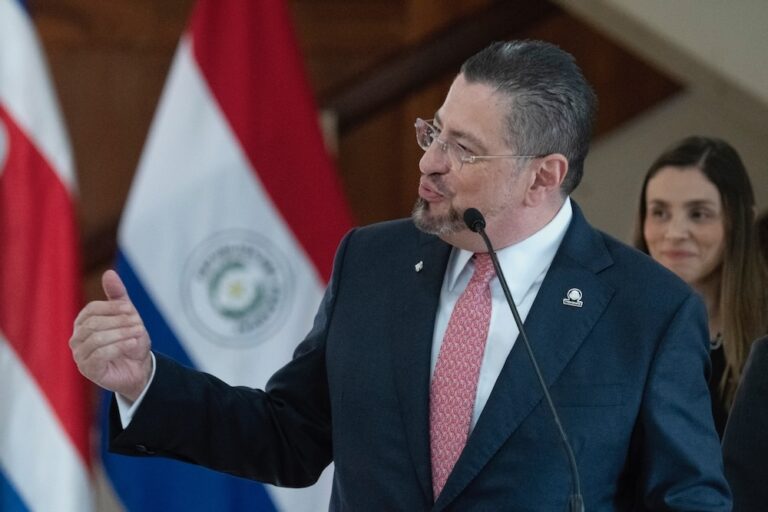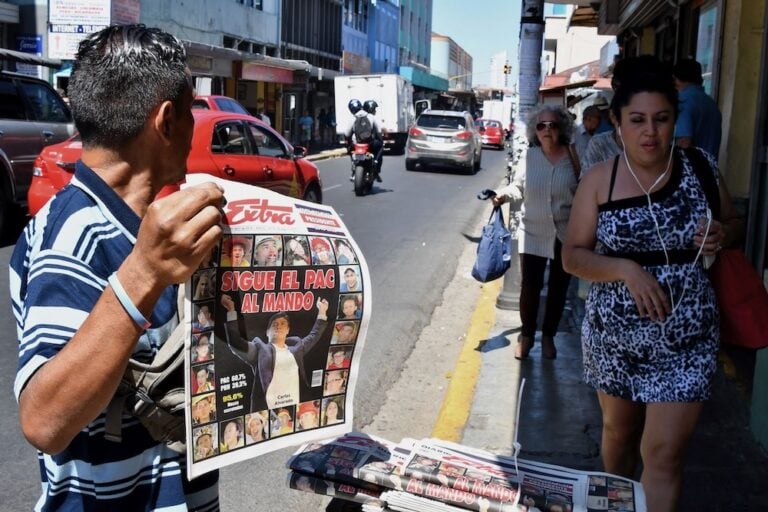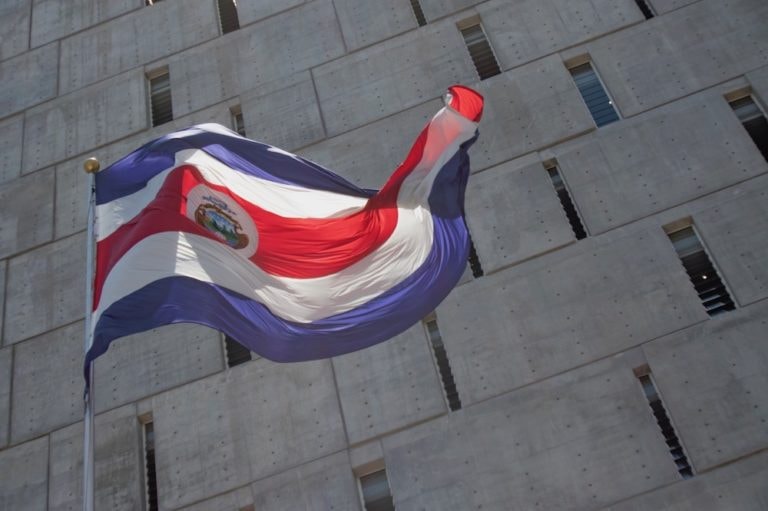(WPFC/IFEX) – The following is a 26 March 2002 WPFC press release: March 26, 2002 World Press Freedom Committee Applauds Elimination of Costa Rica’s “Insult” Law; Further Reforms Are Needed The World Press Freedom Committee welcomes recent action by the Legislative Assembly of Costa Rica to eliminate the outdated and restrictive law making it a […]
(WPFC/IFEX) – The following is a 26 March 2002 WPFC press release:
March 26, 2002
World Press Freedom Committee Applauds Elimination of Costa Rica’s “Insult” Law; Further Reforms Are Needed
The World Press Freedom Committee welcomes recent action by the Legislative Assembly of Costa Rica to eliminate the outdated and restrictive law making it a crime to “insult” the dignity of the president and other public officials.
“Elimination of Article 309 of the Criminal Code represents a valuable precedent to be imitated by all Latin American nations,” said WPFC Chairman James H. Ottaway, Senior Vice President of Dow Jones & Company and Chairman of Ottaway Newspapers, Inc. “Clearly, in the year 2002 in the democratic republic of Costa Rica – and in democracies everywhere – there is no place for such restriction on public commentary on public officials.”
One year ago, Ottaway led a WPFC delegation to Costa Rica, personally urging President Miguel Rodriguez, as well as legislators and judges, to bring Costa Rica’s laws in line with principles of press freedom laid out by the Inter-American Commission on Human Rights. Elimination of desacato laws was one of those recommendations, as was the decriminalization of libel, slander and defamation laws.
The elimination of Costa Rica’s desacato law is significant for two outstanding reasons:
* It represents compliance with the recommendation of the Inter-American Commission on Human Rights more than six years ago that such laws are not compatible with Article 13 of the American Convention on Human Rights and should be eliminated. It also brings Costa Rica closer into line with the American Declaration of the Rights and Duties of Man, which as a member of the Organization of American States, Costa Rica adopted in 1948.
* It implies important acknowledgment of the universally recognized principles of public disclosure and press freedom. In eliminating the crime of “insult,” leaders and legislators accept full responsibility as public officials answerable to the citizens they serve. To their credit, they thus recognize that they are servants of the public and the nation, not personifications of the state.
While elimination of the country’s long-outdated desacato law is a most welcome development, this cannot be the final step in Costa Rica’s movement toward full press freedom.
Specifically, WPFC seeks reform of laws covering defamation, libel and slander to eliminate criminal aspects and to comport with customary libel and slander laws found in established democracies. Three articles in particular merit changes.
1. Article 149, which establishes the “evidence of truth” (prueba de la verdad) as a necessary standard for journalists to prove. This article must be revised to bring it into conformity with press freedom principles. We suggest that the Article be revised thus:
In public interest issues, there will exist the possibility of libel, defamation or slander only if the statements made public by the defendant are proven by the plaintiff to be false and if the publication of the statement was done with reckless disregard for the truth and with a pure will to offend.
2. Article 151, which as it currently stands establishes some “exclusions” of responsibilities to people who have been accused. Reform would increase the number of such exclusions. Revision:
Information, humorous expressions and opinions or unfavorable judgments made public as part of a journalistic duty, or exercising professional, literary, artistic, historic, scientific, political, or sports criticism or criticism in the context of any other public interest activity shall not constitute an insult.
3. Article 152, which as it stands is most restrictive, penalizes the “reproduction of offenses.” We suggest introducing instead the principle of “faithful reproduction,” which is recognized by the Inter-American Commission on Human Rights. We suggest Article 152 be revised thus:
Whoever faithfully reproduces information or opinions by a third party, or provides an author a media vehicle necessary to publish, broadcast or sell statements branded as libelous, defamatory or slanderous shall not be considered a criminal. This person shall be held accountable only when he or she is aware of the statement’s being false or that it was published with the sole purpose to offend.
Such reforms by the lawmakers and leaders of Costa Rica would help secure the country’s reputation as a true leader in the hemispheric pursuit of democracy and human rights.
A new administration is scheduled to take over May 1 in Costa Rica. The new President and the new Legislative Assembly thus have the opportunity to wipe clean a slate still containing anachronistic statutes that effectively limit the free flow of information and thus the full flowering of democracy in Costa Rica.
We challenge the new leaders to demonstrate their understanding and acceptance of the principles of democracy by enacting the reforms needed to bring Costa Rica’s laws into line with internationally recognized fundamental principles of press freedom as set forth in the Universal Declaration of Human Rights which states in its Article 19:
“Everyone has the right to freedom of opinion and expression; this right includes freedom to hold opinions without interference and to seek, receive and impart information and ideas through any media and regardless of frontiers.”
Action by Costa Rica’s leaders to reform the laws of libel, slander and defamation would go far in security the country’s reputation as a true leader in the hemispheric pursuit of democracy and human rights.
We urge that incoming lawmakers make these reforms a priority issue in the next Legislative Assembly. We will monitor these deliberations and will take note of their progress.
The World Press Freedom Committee, with headquarters in Reston, Va., includes 44 journalistic organizations on six continents and is dedicated to the promotion of news media free of government interference.


